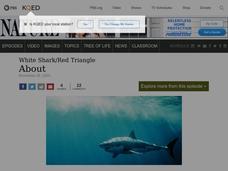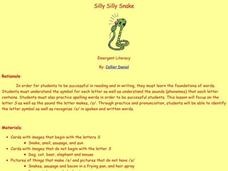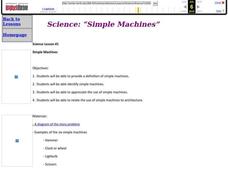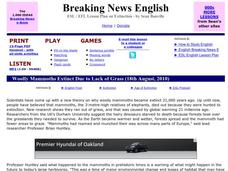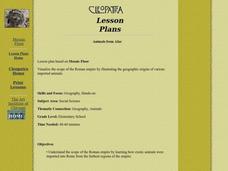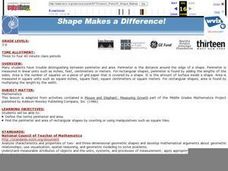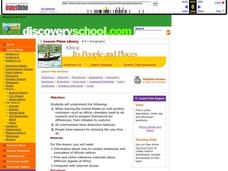Curated OER
Shark Attack
Students examine the white shark. They think critically about a set of shark facts and predict whether the statements are true or false. Students describe a year in the life of a white shark living in the Red Triangle. They create a...
Curated OER
Emergent Literacy
Students practice speaking and spelling words, and recognize and demonstrate understanding of sounds (phonemes) that each letter contains. Students focus specifically on letter S and its sound.
Curated OER
The Door is Creaky E
Students observe the prop of a door to demonstrate the sound of the phonemic sound of the letter "e". Then they drill and practice the sound with the teacher. The essential importance of the skill of phonemic awareness is stressed in the...
Curated OER
Bug Jokes
In this biology learning exercise, students use the given code to discover the punch lines for each of the funny jokes as they relate to different bugs. Then they compare their answers to others in class.
Curated OER
Table Drills
In this math worksheet, students complete the four tables that use the four operations. The drills are meant to be part of the drill and practice to increase calculation skills.
Curated OER
Circus Similes
In this fill in the blank worksheet, students complete similes comparing items at the circus to other items. The items being compared include a clown, lion, tent, circus and peanuts.
Curated OER
Using Commas to Write Lists
In this commas in lists worksheet, students examine 3 labeled pictures and the name of someone who bought the items. Students write a sentence with commas in a list. Students then insert commas in 10 sentences with lists. There are no...
Curated OER
A or An
In this word choice worksheet, students read the sentences and select whether to use the article adjective a or an for each sentence. Students complete 20 sentences.
Curated OER
Which Kind of Sentence
In this type of sentences worksheet, students read each sentence and write the correct punctuation at the end of the sentence. Students review examples for declarative and interrogative sentence endings. Students complete 10 sentences.
Curated OER
Too Two To
In this word usage worksheet, students read the sentences in each paragraph and determine which form of to/two/too should be used to complete the sentence.
Curated OER
Learning About Mammals
Students study the mammal classification and forms of them living in the United States. In this mammal study lesson, students read through orders of mammals that exist in the United States. Students also study the taxonomy of an eastern...
Curated OER
Designing for the Future
Students analyze the architecture of the United Architects and Ken Yeang. In this architecture analysis lesson, students explore architecture design for its sustainability, safety, and purpose. Students write an article about one of the...
Curated OER
Simple Machines
Learners define the term simple machine, identify and appreciate their use. In this simple machines lesson students complete an activity and share their ideas.
Curated OER
Breaking News English: Woolly Mammoths Extinct Due to Lack of Grass
In this English worksheet, learners read "Woolly Mammoths Extinct Due to Lack of Grass," and then respond to 1 essay, 47 fill in the blank, 7 short answer, 20 matching, and 8 true or false questions about the selection.
Curated OER
Animals from Afar
Pupils visualize the scope of the Roman empire by illustrating the geographic origins of various imported animals. They study how exotic animals were imported into Rome from the farthest regions of the empire.
Curated OER
Relative Size: Big and Little
Students work with big and little objects by placing objects in order small to large, and by completing a worksheet.
Curated OER
"If You Hopped Like a Frog" by David M. Schwartz
Students brainstorm several animal/personal scenarios, select one, and write out an explanation of the comparison. They apply the measurements/characteristics to themselves and use algebraic equations to demonstrate the comparison.
Curated OER
What Animals Eat
First graders organize animals according to what they eat. They compare the teeth of plant eaters and meat eaters.
Curated OER
Adapting to Animal Behavior for Survival
Second graders explore animal behaviors and adaptations by researching several different animals and their habitats.
Curated OER
"Home Sweet Home?"
Students research an endangered animal's habitat, investigate the survival problems. They research the animal's zoo life. They research some programs of reintroduction and chart the pros and cons of each.
Curated OER
Shape Makes a Difference!
Learners learn the difference between perimeter and area by watching a video and a hands on activity.
Curated OER
Endangered Animals Report
Fifth graders research an endangered animal and create a written and technological report. Students present their slide show report to the class. The class completes a rubric for each student presentation.
Curated OER
Aspects of Participatory Citizenship
Students research the current issues about the government of Canada and develop their presentation skills.
Curated OER
Palpating Pachyderms: How Do We Interpret Observations?
Students interpret a poem before completing activities to distinguish observations and interpretations. They examine how personal background can influence how a person interpreters what they observe.
Other popular searches
- Elephants Elmer
- Elephant Seal Food Chain
- Elmer the Elephant
- African Elephants
- Shooting an Elephant
- Animal Rights and Elephants
- Hills Like White Elephants
- Elephant Crossword
- Asian Elephants
- Elephant Toothpaste
- Elephant Word Search
- Elephant Seals


